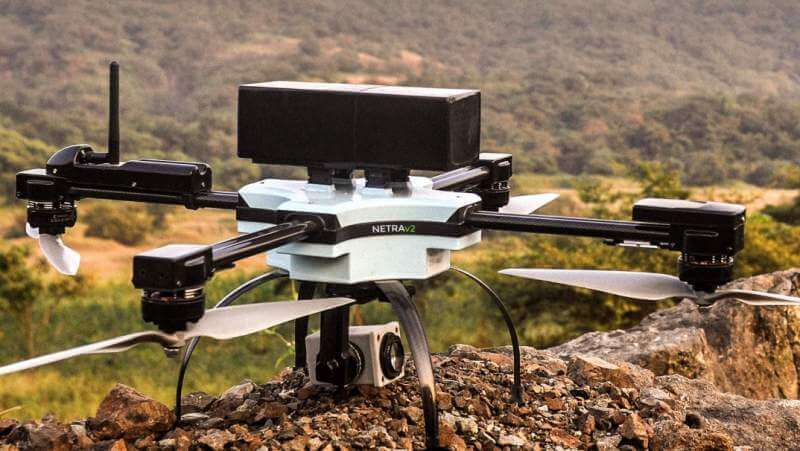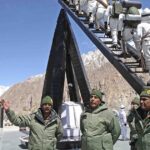
Table of Contents
SOURCE: Mixed Bag Media
It’s no secret that there’s a deluge of Chinese-made drones in India but domestic drone makers are fighting back, vying to reclaim lost turf. “Our drones are not just more efficient than their Chinese counterparts, but also more secure for the country,” Vishal Saxena, vice president of surveillance and mapping at ideaForge, an Indian drone maker, told MediaNama. He also told us that a major reason why we should be wary of Chinese drones is because they are primarily in the business of “data arbitrage”.
Saxena was speaking to us after his company recently started buying back drones which aren’t compliant with India’s drone regulations in exchange for a compliant drone that they make in-house, called Ninja UAV. At least five people from the drone industry have told us that most of these non-compliant drones, which don’t support the currently mandated no permission, no takeoff (NPNT) protocol, were imported from China.
“We got a lot of hits on our website about drones made in India, which are also compliant with the no permission, no take off (NPNT) protocol, as mandated in current drone regulations,” Saxena told us when we asked why they started this program. “Private surveyors are worried about using Chinese made drones. What if the government tomorrow comes out with an ordinance outlawing all Chinese drones?” he asked. His statement comes amid heightened tensions between India and China, where deadly clashes along the Indo-China border have led to a ban on 59 ‘Chinese’ apps, and many companies in the electronics industry, cancelling orders of raw materials coming from China.
Saxena said that most “Chinese” drones have 500-800 flights of around half an hour each while ideaForge’s drones that they are giving in return can manage 1500 flights after purchasing additional extended support. Even though Saxena didn’t specifically mention a Chinese company, his remark was aimed at DJI, arguably the world’s biggest drone manufacturer. Several people in the drone industry have told MediaNama that DJI has more drones in India than any other company. Several government entities including PSUs and law enforcement agencies use drones made by DJI. Its drones were the most common drones in use during COVID-containment drives in various parts of the country.
DJI has a massive presence in India despite its drones not complying with India’s current drone regulations, notably missing the mandatory “no permission, no take off” (NPNT) compliance. The Chinese drone maker has openly criticised the NPNT protocol saying that it “places heavy restrictions on the location, flight path, and time for operating drones, including a colour-coded system for how and where drones can fly”. The reason why their drones are still able to fly despite the non-compliance is because DigiSky, the website which is supposed to handle NPNT clearances, isn’t functional yet.
‘We don’t know where the data is going’
However, more than the efficiency, we should be wary of what some China made drones can potentially do with the data they collect, Saxena suggested. “Look at most of the companies coming out of that origin. Their model is based on data arbitrage. We don’t even know where that data is going,” Saxena said.
Despite DJI being a Chinese company, the government very recently allowed its drones to survey pipelines of the Indian Oil Corporation. To this, Saxena said, “IOCL is using drones made by a certain company, but we don’t know how their drones are connected, and what will happen to that data.” “If our drones are doing the same job, you can be assured that our customers’ data isn’t going anywhere outside India,” he added. We have reached out to DJI for information about data sharing.
Why should we trust Indian companies?
However, who is to say that Indian companies couldn’t be as much of a privacy and security threat as Chinese companies allegedly are? When we asked why should Indians even trust their data in the hands of an Indian company, Saxena said that if “our drones are doing a job, you can be assured that our customers’ data isn’t going anywhere outside India”. “If I am surveying Indian Oil’s pipelines, I’ll never breach its security or data privacy,” he added.
Kruthi Aramanamada, head of marketing for ideaForge added that their drones don’t store any data on a server but on a laptop or tablet that’s used for flying the drone., and are therefore more secure. “We completely respect everyone’s privacy. We started with [making drones for] defence, where security is paramount.”
However, when we emphasised about drone data potentially being used against Indian citizens, Saxena also said that they only build tools for the job, but what their customers — which includes the government — do with those, is entirely up to them.
Accepting drones not registered with the DGCA as well
When we asked what the company will do with the non-compliant drones it will receive as part of this buyback scheme, the company said that “we will decide what to do with this repository of foreign drones, we will either scrap it or ship it out of the country, we are figuring out to do [the]latter legally*”. If a drone isn’t airworthy, they’ll scrap it.
The company is also accepting drones that have not been registered with the civil aviation regulator, and as a result don’t have what is called a Drone Acknowledgement Number. “There are around 20,000 drones that have been registered with the DGCA, and we are expecting about 80% of those to be foreign made. Also, in reality, the actual number of drones in the country is three times than what has been registered with the government,” Saxena said.
“We’re okay with accepting a drone even without a DAN as long as it has a serial number,” he added. When we asked whether the company will apply for a DAN for drones that don’t have one, Aramanamada said that they will, since the idea is to offer those drones to the government in times of emergency.
*Update on July 24: ideaForge had initially, on July 23, said that they would retain the drones that they’ll receive as part of this buyback scheme and offer those to the government in times of crisis; however, the company, on July 24, backtracked on that statement and clarified that they will ship airworthy drones out of the country in a “legal” way. Article was updated to reflect the change; originally published on July 23.
The original article stated that data is stored on drones locally, but the company on July 24 clarified that data is stored on a laptop or tablet that is used to fly the drone. Article was updated to reflect this change.






